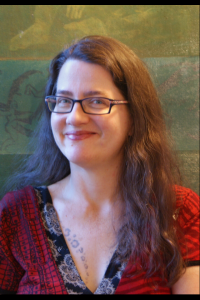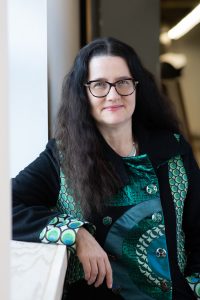 Portal fantasy isn’t “in” right now, I’m told, which may mean that sexy vampires, wanton werewolves and George R.R. Martin are still the engines pumping life and lucre through the genre bookselling sections. Which is cool. Go them, I say, pump on! My students, interestingly, are being told by potential agents and editors that the hunger for dystopian YA SF is on the decline. Is it true? You tell me. What are The Youth reading instead?
Portal fantasy isn’t “in” right now, I’m told, which may mean that sexy vampires, wanton werewolves and George R.R. Martin are still the engines pumping life and lucre through the genre bookselling sections. Which is cool. Go them, I say, pump on! My students, interestingly, are being told by potential agents and editors that the hunger for dystopian YA SF is on the decline. Is it true? You tell me. What are The Youth reading instead?
True, false or otherwise, the implication is that we portal fantasists are tragically failing at literary fashion whoredom. I hate to disappoint anyone, and so hereby declare this: give me an HBO deal and I’ll write something with a house of ill repute (because whorehouses seem to be a requirement for HBO series) and a high body count. Werelizards of the Mustang Ranch, here I come!
If possible, I’d like for Tom Hiddleston to play the tormented vampire pimp of the assorted paranormal service providers. Hmmm, maybe I should call it Game of Bones.
If someone wants to volunteer to make this happen, I guarantee I will finish my series before George.
“Why Portal Fantasy?” was one of the questions Paul Weimer asked when I threw out the “What should I blog about?” question. As a result, I’ve been thinking about Oz, Narnia, Wonderland, and also newer portals, like Charlene Challenger’s The Voices in Between. I could also argue that Hogwart’s and the wizarding world are pretty darned portaltastic, in their way, even if the wizard war does affect the Muggles.
Why draw our heroes from the present day and then take them to a completely other realm? What does that offer? Where’s the appeal?
With portal fantasy, the characters are us. They’re not charming and relatable strangers from a faraway land, or ye folke from a distant past that looks an awful lot like the European Middle Ages. They are people from the author’s own here and now, usually; they’re drawn from a very recognizable time and place.
Furthermore, these characters generally spring from an everyday existence that is, not to put too fine a point on it, a world of suck. The birth universe of a portal fantasy hero is rarely an endless cascade of cake and GooglePlay gift certificates. Adoni’s mother is off the sauce, and Harry Potter’s living under the stairs. The Narnia kids are refugees from the Blitz, which by all accounts was a singularly unenchanting period of British history, even if it does turn out there’s an endless market for BBC dramatic set during and just after the event.
Magical Whorehouses of the Blitz! I could write that.
Tangents aside, crappy things are happening, and the portal fantasy protagonist is genuinely powerless to do anything about them.
You all know that feeling of being meat in a grinder, chum in a shark tank. You’d fight if there was any point. There’s not. This is a situation that speaks to us all.
Portals, meanwhile, always seem to offer a fast track to the movers and shakers, both good and evil, of the shiny new world. Lucy and Dorothy tumble out of World War II and the Depression, where they run afoul of the witches White and West, respectively. Harry’s barely out of the womb before he’s up the Nose that Cannot be Named. And they aren’t just pissing off the baddies: Aslan, Dumbledore and Glinda are right in there, mitts out, offering help, education, assistance and sometimes footwear.
The point is this: in the portal world, characters not only can have an effect on things, but are game-changers. These are stories where ordinary(ish) people are empowered to do good, destroy regimes, and topple immense stacks of wickedness. The characters start as jonobody16@trulyfrigginshafted.com and find themselves leading revolutions, slaying dragons, and taking thrones.
This is what protagonists do, of course, in any number of genres. But there’s something very specifically appealing about imagining that kind of a getaway. You leave behind all the mundane and seemingly unchangeable crap of your day to day existence, your obligations and dysfunctional relationships–everything from the boss who nags you to climate change. You go exploring in a magical land filled with cool things. That land has problems too, but they’re ones you can actually address. It’s an empowering and very personal form of escapism.
As kids, we have few options for getting away from whatever’s going on around us. For good or bad, we’re largely trapped. I imprinted on The Chronicles Of Narnia and books like them at a point in my life when there was no getting away. I love these stories, and I’m writing portal fantasy because I adore creating hidden and undiscovered worlds. I look for them in closets and overgrown back alleys, in the dimmest unlit stacks of used bookstores. I find them on the page, resonating–in the case of Stormwrack–to the beat of the World Clock in Moscasipay.
I’m an adult now, and my book–though it’d be terrific fun for a teen-aged reader–isn’t a kid’s book. Sophie Hansa is twenty-four, and she’s not particularly trapped. So what’s adult portal fantasy for? Why would anyone face monsters and pirates when they have a home and an affectionate family and the beginnings of a pretty cool career? What is it about humans that we sometimes long to escape our lives even when nobody’s keeping us in a broom closet under a stairwell?
There are some answers in Child of a Hidden Sea. I hope you enjoy finding them!









My review will reveal what I thought! (and yes, I did tag the whole Portal fantasy thing. But given that I asked YOU about it, you are not surprised…)
Post-apocalyptic books can be considered a type of portal story — you send the whole world into another world.
And HBO did discover that people will listen to more exposition if delivered by, or in the company of, a naked hooker. ’tis a new literary technique!
Your Emberverse books qualify, in that sense.
Did you ever see Michael Scott Rohan’s CHASE THE MORNING series? Portal fantasy, and very good.
Oh, I’ll look into that!
Oh yes. I remember those books well, Steve. My late friend Scott introduced me to those.
A spoiler for my review, Alyx, I do mention Rohan in it. 🙂
Telling me about Rohan just increases the chances I won’t get to Steve’s next book soon!